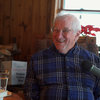County sheriff’s office approves of possible ATV trail network in Berne
BERNE — Berne Planning Board Chairman Joe Martin’s dream of more plentiful riding opportunities for ATV enthusiasts in the Hilltowns through a trail network administered by the Hilltown Riders got a thumbs up from the Albany County Sheriff’s Office this week as the town inched toward a public hearing on the matter next year.
The Hilltown Riders are a private club for all-terrain-vehicle riders that oversees two trails in the Capital Region, one on its own over-600-acre property in the Saratoga County town of Day, and the other on land the club leases from Camp Pinnacle, in New Scotland. In exchange for access to private lands, the club requires its members to adhere to certain regulations and registration requirements.
The club members hope that, with the town’s approval and willingness to open certain roads up to riders, they’ll be able to create more trails on various properties in Berne, an initiative on which Martin has taken the lead.
At the town board’s Nov. 9 meeting, Commander Tom Praisner of the sheriff’s office told the board that his primary concern is keeping the public safe.
He also said that law enforcement could step up its presence in the town to ensure that any influx of riders does not create problems for residents and those passing through the town. Praiser said though that the sheriff’s office wouldn’t go as far as setting up checkpoints to check for registrations unless unregistered riders become a problem.
“I just want to make sure that everyone out there is having fun, they’re registered, hopefully insured, and they wear their helmet,” Praisner said, adding that he is interested in becoming a member himself, for his own interest and to keep an eye on trail behavior.
Berne Supervisor Dennis Palow asked if officers would be able to carry out more patrols in the town, to which Praisner said, “Absolutely. I can make that happen.”
However, Praisner added that he’s “not going to give anybody a hard time” over neighbor complaints, so long as laws are being followed.
“Neighbors are going to call and they’re going to complain,” Praisner explained. “If we just ignore that, that’s a whole other separate issue in itself, and that’s another complaint, so we can’t ignore it. We’ll come out and we’ll address it, but I’m not going to give anybody a hard time … but if you’re ripping up the street at 60 miles an hour, well, that’s an issue.”
If rules are followed, Praisner said, “and no one gets hurt, you’ll never even hear from me.”
As for the town roads that might need to be used, Martin suggested starting with “secondary roads” and then identifying “places that need to get pulled back.”
“It’s a new model … for Albany County,” Martin said, adding that ATV riders face stigma compared to snowmobilers, and that he hopes wider, more visible use of ATVs will break that stigma, and result in snowmobile clubs in the area opening their trails up to ATV riders.
“We have work to do to break that stigma, so we need the board’s support,” Martin said.
Palow said the board would likely hold a public hearing in January to give the town time to consult its lawyer and “get things situated.”
Club rules
Hilltown Riders Vice President John Dybas and other members of the organization’s board were at the Nov. 9 meeting to explain how the group operates, and what steps it takes to ensure riders’ safety and compliance with club rules.
For instance, Dybas said, when a rider once brought a passenger up a steep hill on a modified vehicle and both got hurt, the group made a rule that passengers were allowed only on vehicles designed for more than one person.
“My point is, whenever there’s an issue or a problem, we address it,” he said. “We try to keep things safe and happy for everybody.”
Riders, Dybas said, are required to wear helmets, hold insurance, and to have their vehicles equipped with club-provided plates that have a rider number, making each person identifiable to anyone who might need to report a concern, in addition to their standard state plate.
And, while the group has not figured out a way to monitor sound levels, Dybas said that the club requires stock mufflers on all vehicles to ensure consistency, and that closed-course racing machines are not allowed since they’re typically louder than standard ones.
In the town of Day, Dybas said, “we work with the town, we’ve worked with the first responders, we make maps, we mark the trails … so people don’t get lost.”
The club itself has insurance, Dybas said, so that “anybody driving on one of our marked trails is covered by our insurance policy.”
Broken rules result in administrative action by the club, whether it’s a reminder about the rules, a warning, or outright dismissal, Dybas said, adding that the consequence depends on the seriousness of the infraction, and whether it’s been repeated.
“If you’re bringing a kid on the back of an ATV with no helmet and flying around with them, that’s serious,” he said.
And, preemptively addressing concerns about a huge number of riders suddenly flocking to the town if all this goes through, Dybas said that the use of the club’s existing trails is less frequent than one might expect, calling them “the most under-utilized thing you ever saw in your life.”
“Typically, you go to one of the parking lots where our trails are, you might see two, three, four trucks,” he said. “That’s it. During the week, you might not see anybody four out of five days.”
One board member, he added, went through the group’s logbook, which riders are supposed to sign each time they use a trail, and determined there was “never a crowd.”



